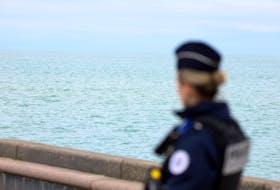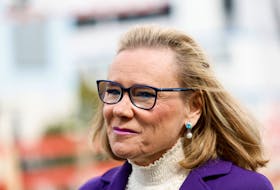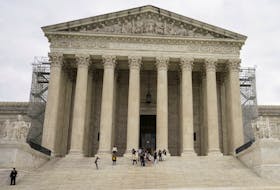FACT: The Public Utilities Board (PUB) did look at the Muskrat Falls project before it moved ahead, under a review limited in scope and restricted in time. The review as ordered was not best practice and the findings weren't to everyone's satisfaction.
The PUB has been a subject of questions at the Muskrat Falls Inquiry, particularly in relation to the review it was ordered to undertake by the provincial government considering two options for meeting provincial power needs, before the Muskrat Falls project was approved.
The PUB — formally known as the Board of Commissioners of Public Utilities — is the quasi-judicial body responsible for regulating electrical utilities in Newfoundland and Labrador. Established in 1949, its mandate is to ensure that power is provided safely and reliably, at reasonable cost.
The Muskrat Falls hydroelectric project was exempted from a full review by the PUB under a Liberal government in 2000. And if you look back more than 30 years, you’ll find other power projects of over 45 megawatts of potential generation exempted from review by the PUB. The decisions to go ahead with the Bay d'Espoir hydroelectric plant — still the largest power producer on the island of Newfoundland — and the decision for the Holyrood Thermal Generating Station are examples.

But in the spring session of the House of Assembly in 2011, then-premier Kathy Dunderdale said a coming review to be undertaken by the PUB would help the public understand the Muskrat Falls project and provide answers being demanded by political opposition.
"What is the critical question?,” Dunderdale asked on May 18, 2012. “Is Muskrat Falls the lowest cost option for the people of Newfoundland and Labrador for electricity generation? That is the question that is going to be put to the PUB. When that question is answered from the PUB, all of the other answers to the other questions will become absolutely clear."
In mid-June 2011, the government made a special reference to the regulator.
The PUB was asked to look at a proposed “isolated island” option for power for Newfoundland, addressing the failing Holyrood thermal power plant and adding small hydro and wind generation, versus an “interconnected” power option, being the Muskrat Falls project, including linking the isolated island system to Labrador, the mainland. The question was: what option would be the least-cost for the supply of power from 2011-2067?
The review was troubled from the start.
At the Muskrat Falls Inquiry, former Nalcor Energy board members were asked by inquiry co-counsel Kate O’Brien if they were aware the regulator was left looking for information from Nalcor Energy, facing “significant delay” in getting the information requested.
As The Telegram reported during the review period, the delay began a domino effect, contributing to the need for the PUB to request an extension to an already ambitious timeline set by government.
RELATED STORIES
PUB Muskrat review scaled down: Wells (December 2011)
PUB criticism just 'white noise': minister (January 2012)
Nalcor acknowledges delays in review responses (February 2012)
PUB makes no decision on power supply options (April 2012)
Muskrat Falls Inquiry - From 'unacceptable' PUB decision to methylmercury (October 2018)
“I was aware of some information requests, but not aware of the details. I can’t really expand on that,” said former Nalcor board member Gerry Shortall, in response to O’Brien’s question at the inquiry, with others giving no indication they recalled delays, apart from former board chair Ken Marshall (who was a board member during the PUB review period).
“I think that from my recollection, again, quite a while back now, but in essence it was the request was for Decision Gate 3 numbers (with advanced Muskrat Falls project engineering) which weren’t quite ready yet, so I don’t know how we could provide them if they weren’t provided to even read internally,” he said.
The PUB review was working with earlier cost estimates and project schedule estimates.
O’Brien asked Marshall if he had any memory of the PUB being otherwise left waiting on information requested from Nalcor Energy and subsidiary Newfoundland and Labrador Hydro. “No,” he said.
But there was a problem at the time.
Information delays
The Crown corporation made its first filing of documents to the regulator, in response to a request for information, on June 30, 2011. Its main filing on the reference question and the response to further requests for information were slow in coming.
In a letter to the board — dated Nov. 7, 2011 and available on the PUB website — Nalcor vice-president Gilbert Bennett accepted responsibility for the information delays.
"We respectfully request that a new deadline be considered for completion of existing and outstanding (requests for information)," he stated at the time.
The board was to file a final report to government by Dec. 31, 2011. But delays led the PUB to request an extension. The new date given for a final report was March 31, 2012.
Andy Wells, the former mayor of St. John’s who was PUB chair at the time, spoke up publicly about the ongoing review, expressing disappointment with the information available and timeline given, even with the three-month extension.

"The public consultation is going to very restricted. I don't know whether we will be holding a technical conference. The consumer advocate role will be substantially restricted. There is not sufficient time," Wells told The Telegram.
"In order to meet the March 31 deadline, we have to start writing our report in mid-February. What we really are looking at is two to three weeks of work that we thought would require three months.”
Criticism emerged around the review process, including the use of outdated information (mainly the early cost estimates), but particularly the forced end-date. The list of individuals publicly commenting — saying the PUB should given more advanced estimates and more time — included but was not limited to: economist Wade Locke, former Natural Resources minister Shawn Skinner, former PUB chair David Vardy and former City of St. John’s manager Ron Penney.
There was some criticism of the PUB even being assigned the “least-cost” review to begin with. In a letter to the editor in February 2012, Des Sullivan said the Muskrat Falls debate needed to take a closer look at the broader business risk involved in having the province and its Crown corporation undertaking a megaproject like Muskrat Falls. He said it was different from the PUB’s regular work of determining the legitimate capital costs in a utility’s proposed annual budget, or establishing the appropriate rate of return for a utility.
The debate heated up, but then Natural Resources minister Jerome Kennedy refused any change in the terms or further extensions to the PUB’s deadline, calling the criticism: “political white noise.”
Final report draws criticism
The board finalized a report on March 30, 2012, concluding, "the information provided by Nalcor in the review is not detailed, complete or current enough" to decide whether or not the Muskrat Falls project was cheaper than the “isolated island” option.
Project proponents attacked the board — including members Wells, vice-chair Darlene Whalen and Commissioners James Oxford and Dwanda Newman — for not doing its job. In the House of Assembly on Nov. 20, 2012, then premier Kathy Dunderdale said the PUB "failed the people of this province" in not making a decision on the preferred option.
The criticisms of the board started immediately in the wake of the report. On April 3, 2012, former premier Danny Williams issued a press release saying: "I am concerned that perhaps the (Public Utilities) Board wanted to wash their hands of any responsibility of this project in the very unlikely event that something goes wrong."
In late April, former federal Environment minister and then-senior vice-president and vice-chairman of CIBC Jim Prentice spoke about the PUB in an address to members of the province’s oil and gas industry association. His speech was titled: “Nation building infrastructure: Why Lower Churchill Matters.”
“The utilities board report was long awaited not only within government but also across this province. It was expected by many to serve as an influential judgement on the project and provide the people of Newfoundland and Labrador with clarity but if anything, the report has muddied the waters,” read the speech.
The PUB did not make a decision on the project before its sanctioning. But it’s worth noting the project presented to them also no longer existed by the time Muskrat Falls was given the go-ahead, considering changes to design and cost estimates. The government also went back to Manitoba Hydro International, the PUB's chosen consultants, to have them update their evaluation of the project before sanctioning.
Change in legislation
The day after the project was sanctioned, the provincial government introduced Bill 61 as a means of assuring the project costs would be paid for by ratepayers and financing made possible. Natural Resources Minister Jerome Kennedy said, once the legislation passed, Muskrat Falls costs would be simply added into the calculations on power rates. The regulator would not review them.

In the briefing for reporters, Kennedy suggested the government was looking at making changes to the regulator itself at that point.
“Forget whether this PUB, which we will look at after Christmas…,” he said, prompting followup questions on his meaning.
“The Liberals have been calling for changes to the PUB,” he said. “What I’m saying to you is after Christmas, when this is all done, we will be seriously looking at the structure of the PUB as it’s set up in this province — I’m not talking about the individuals — the structure of the PUB as it's set up in this province, to determine if there’s a way to strengthen it and to ensure that we have the people there to carry out the work that needs to be done.”
The first phase of the Muskrat Falls Inquiry covers the period up to the project’s sanctioning and is scheduled to hear from: PUB counsel Maureen Greene (Oct. 24); engineer Fred Martin, who served as a technical adviser to the PUB during the pre-Muskrat Falls review (Oct. 24); Wells (Oct. 25) and Whalen (Oct. 25), with all dates subject to change.
As part of the terms of reference, the Commission of Inquiry has been specifically asked to look at whether the decision the project should be exempted from standard PUB oversight “was justifiable and reasonable” and the effect, if any, on the Muskrat Falls project costs, having ballooned since to stand now at an estimated $12.7 billion.
In his interpretation of the terms of reference, Justice Richard LeBlanc stated he will look at the legislative exemption put in place in 2000 regarding a Lower Churchill Project, why the Progressive Conservative government made its reference to the PUB anyway on Muskrat Falls, and whether or not timely information was provided for the review.
He has also committed to looking at any interference during the review process, and if the PUB’s failure to decide on a least-cost option affected the project’s development or cost.

![['(From left) Dwanda Newman, commissioner; Jim Oxford, commissioner; chairman and CEO Andy Wells; and Darlene Whalen, vice-chair of the Public Utilities Board prepare their notes after they arrived to begin proceedings into the Investigation and Hearing into Supply Issues and Power Outages. — Photo by Joe Gibbons/The Telegram']](https://saltwire.imgix.net/pub-2547598.jpg?cs=srgb&fit=crop&h=568&w=847&dpr=1&auto=format%2Ccompress%2Cenhance)







